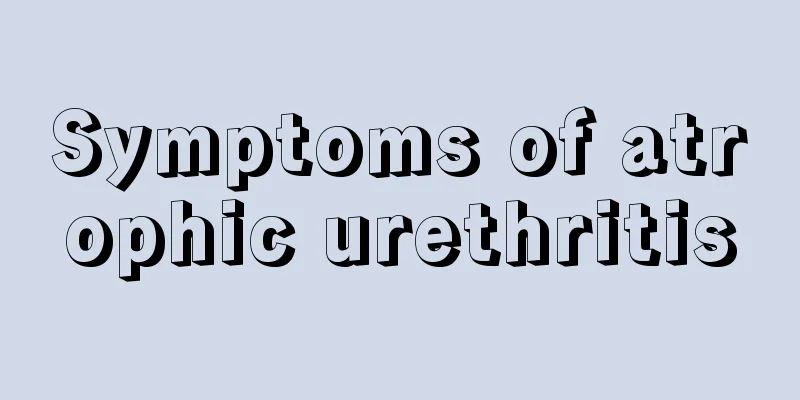Why does saliva smell? What's the matter with saliva smelling?

|
Some people have bad breath and are even afraid to stand face to face with others, which seriously affects their self-confidence and social skills. Some people think that it is the saliva that smells, but why does the saliva smell? What is going on with the saliva that smells? In fact, it is not because of the bad saliva. The bad smell in the mouth is mostly caused by oral diseases. For example, periodontitis problems such as tooth decay and residual roots can cause bad breath. 1. Why does saliva smell bad? According to statistics, 80% to 90% of bad breath comes from the oral cavity. Untreated caries, residual roots, residual crowns, poor restorations, abnormal anatomical structures, gingivitis, periodontitis and oral mucosal diseases in the mouth can all cause bad breath. Among them, dental caries and periodontal disease are the most common related diseases. Food residues and plaque often remain in deep caries cavities and under overhangs of poor restorations, and bacteria ferment and decompose them, producing odor. Dental pulp necrosis or suppurative pulpitis can also cause a bad odor if not treated; patients with periodontal disease often have a large amount of tartar and plaque, and the bacteria in the periodontal pockets ferment to produce hydrogen sulfide, indole and ammonia, which produce a bad odor. In addition, periodontal abscesses and pus discharge from periodontal pockets are mostly caused by Staphylococcus aureus combined with periodontal pathogens, which can also emit a foul odor. The quality and quantity of saliva also play an important role. The decrease in the amount of saliva and the increase in organic components such as protein reduce the flushing and buffering effects of saliva, allowing bacteria to multiply and decompose the organic components in saliva, gingival crevicular fluid and food residues, producing a large amount of volatile sulfides, indoles and other substances, causing bad breath. 80% to 90% of bad breath comes from the oral cavity. 2. The harm of bad breath People with bad breath are very likely to develop constipation, hemorrhoids, etc. If patients with bad breath are not treated in time, their gastritis, gastric ulcer and enteritis will often become significantly worse. The number of E. coli in the intestines of people with bad breath is at least 200 times higher than that of other people. The number of Helicobacter pylori in people with bad breath is at least 150 times higher than that in other people. If patients with bad breath are not treated in time, the number of oral flora will increase greatly, and periodontitis, gingivitis, and oral ulcers will occur frequently. Among the gastrointestinal diseases that are closely related to bad breath, the most serious are gastric cancer and gastroparesis. In a survey of patients with gastric cancer and gastroparesis, it was found that these patients' bad breath generally reached the deep standard. 3. Tips for preventing and treating bad breath Chew cilantro, tea leaves, or peanuts. Add some mint or fresh lemon juice to milk or boiling water and drink a glass to remove the odor. Eat some tomatoes, grapefruits, dates, and oranges. In addition, chewing orange peels can also eliminate odors. Chew gum or use breath freshener. Gargling with light salt water after meals can kill bacteria and reduce inflammation. Fresh lemon juice What foods to eat for bad breath 1. Parsley Parsley can effectively neutralize bad odors in the mouth and remove bad breath caused by smoking. If it is not convenient to buy celery, you can also replace it with cilantro, mint, mugwort and cardamom. In order to achieve the best results, you need to chew the above foods more or drink them like tea. These foods not only eliminate bad breath, but also aid digestion. 2. Tea It is bitter in nature and cold in taste, and has the effects of quenching thirst, refreshing the mind, digesting food, and eliminating restlessness and greasiness. Gargling with strong tea or chewing tea leaves can remove bad breath. If you have bad breath after eating garlic, mutton and other foods, put a handful of tea leaves in your mouth several times, chew slowly, and swallow them slowly after the saliva dissolves the tea leaves. It has a very good effect. 3. Yogurt Recent studies by scientists have shown that drinking yogurt every day can help eliminate the level of hydrogen sulfide in the mouth, which is the culprit that causes bad breath. Long-term consumption of yogurt can also prevent the growth of harmful bacteria in the mouth, which can prevent gum diseases and tooth spots. Of course, when choosing yogurt, be sure to choose pure yogurt without adding sugar. yogurt 4. Kumquat It is very effective for bad breath accompanied by chest tightness and indigestion. Take 5-6 fresh kumquats, wash them and chew them. This prescription has the effects of aromatic opening of the orifices, relieving qi and strengthening the spleen. |
<<: What diseases can be transmitted by saliva
>>: What diseases can be detected by saliva examination
Recommend
This shape of oral ulcer is actually cancer
Although most of the oral ulcers we encounter are...
What is the reason for chest tightness and excessive phlegm
Modern people are under great pressure from work,...
Mycobacterium abscessus
A variety of anti-tuberculosis drugs can be used ...
What to do if you lose trust in your husband
Anyone who has had marriage experience or has a c...
Is vermicelli easy to digest?
Vermicelli is a food ingredient with a very high ...
What is the best way to treat lung cancer? Introduction to the best treatment for lung cancer
The best treatment for lung cancer is chemotherap...
Side effects of laser dark circle removal
Many people have dark circles under their eyes. I...
What happens when my eyes feel irritated and have a foreign body sensation?
The eye is a very mobile organ. It can rotate at ...
Medical genetic factors of esophageal cancer
The mechanism of tumorigenesis is one of the most...
How to measure myopia degree
It is best to go to a professional eyewear store ...
What are the methods of thyroid cancer care
What are the methods of nursing for thyroid cance...
Why does cervical cancer cause black blood?
Cervical cancer is very common in our gynecologic...
What are the dietary health care measures for lung cancer patients? Several methods of dietary health care for lung cancer patients
For a disease like lung cancer, which is very let...
How to massage breasts to make them bigger, you need to know these two acupoints
With the trend of society, many women want to hav...
What are the causes of gastric cancer and intestinal cancer
What are the causes of stomach cancer and colon c...









